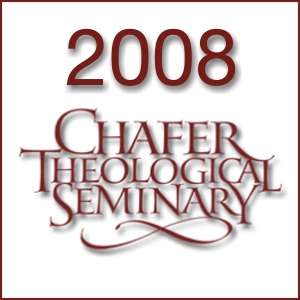
March 2008
Worldviews in Conflict and Psychology and the Church
Conference materials for the 2008 Chafer Theological Seminary annual Pastor's Conference. The themes for the 2008 conference were Worldviews in Conflict and Psychology and the Church. The conference was hosted by West Houston Bible Church March 10-12, 2008. Keynote speaker was Dr. David Noebel and special guest speaker was Dr. Martin Bobgan. Other featured speakers included Rev. Charles Clough, Dr. Robert L. Dean, Dr. Mark Hitchcock, Dr. Thomas Ice, Rev. Daniel Inghram, Dr. George Meisinger, Rev. Ron Merryman, and Rev. Tim Nichols.
To view all video Bible studies in the 2008 Chafer Theological Seminary Bible Conference series, click here (Vimeo) or here (YouTube).
Wednesday, March 12, 2008
Series: 2008 Chafer Theological Seminary Bible Conference
Duration: 53 mins 1 sec
Keynote address - part 3
Wednesday, March 12, 2008
Passage: 1 Peter 2:11-12
Series: 2008 Chafer Theological Seminary Bible Conference
Duration: 1 hr 12 mins 54 secs
Dr. Meisinger's infamous "Stop it!" message.
The subject developed in 1 Peter 2:11-3:12 is that believers should submit to various God-appointed authorities in their lives to witness effectively to unbelievers.
Why does Peter make an issue out of submission? Don’t we have liberty in Christ? Has not the Lord freed us from the Law? Yes, He has. Nevertheless, our exercise of liberty is neither an absolute nor our highest calling. The world needs to see us reflect God’s grace and that high calling sometimes requires the suspension of our liberty for their sakes. The only place unbelievers will see “grace in action” and thus be drawn to the Lord is in our appropriate submissive conduct. God uses His people as reflectors of His grace, but we have to prepare ourselves to live accordingly. ...
The Chafer Theological Seminary update slides are available on the notes link below.
Wednesday, March 12, 2008
Series: 2008 Chafer Theological Seminary Bible Conference
Duration: 1 hr 16 mins 35 secs
The Apostle Paul in writing to the believers in Corinth addresses the issue of litigation in public courts in 1 Cor 6:1–6. After six verses of discourse in which he shames them for airing their personal legal matters in public, biotika, he transitions subjects, as he has done so often in 1 Corinthians, going from courts to wrongdoing in vv. 7-8. Then in 1 Cor 6:9–11, Paul addresses yet another problem extant in the church at that time in Corinth―post-salvation sin. The citizens of Corinth were well known for their immoral behavior, and for some this lifestyle had continued beyond their conversion experience. In 1 Cor 6:9–11, Paul clearly identifies ten activities that are incompatible with the perfect righteousness of God. Whether Paul had or had not devoted much effort to these topics during his first visit to Corinth, we do not know, but we know for certain his focus was on the dissemination of the Gospel of Christ: “For I did not determine to know anything among you except Jesus Christ and Him crucified” (1 Cor 2:2). ...
Wednesday, March 12, 2008
Series: 2008 Chafer Theological Seminary Bible Conference
Duration: 55 mins 57 secs
Wednesday, March 12, 2008
Series: 2008 Chafer Theological Seminary Bible Conference
Duration: 1 hr 12 mins 45 secs
Toward a Biblical Philosophy of History Seeing History as God Sees It Note:
Part 1 of this presentation was taught at the 2007 Chafer Theological Seminary Bible Conference
Tuesday, March 11, 2008
Series: 2008 Chafer Theological Seminary Bible Conference
Duration: 1 hr 9 mins 48 secs
Keynote address - part 2
Tuesday, March 11, 2008
Passage: Revelation
Series: 2008 Chafer Theological Seminary Bible Conference
Duration: 1 hr 1 mins 51 secs
Revelation 3:10 is rightly know as a passage that supports the pre-trib rapture doctrine, but the second half of the verse introduces us to the first use of the term “earth dwellers.” “Because you have kept the word of My perseverance, I also will keep you from the hour of testing, that hour which is about to come upon the whole world, to test those who dwell upon the earth.” 3:10 is the first use in Revelation of a phrase I call “earth dwellers” but usually translated “those who dwell upon the earth.” This phrase is used eleven times in nine verses in Revelation (3:10; 6:10; 8:13; 11:10 2xs; 13:8, 12, 14 2xs; 14:6; 17:8). A preliminary working definition is that “earth dwellers” is a designation for persistent unbelievers during the tribulation. ...
Tuesday, March 11, 2008
Series: 2008 Chafer Theological Seminary Bible Conference
Duration: 1 hr 8 mins 10 secs
Most of us who have believed in the Lord Jesus Christ for eternal life recognize by this point in the early twenty-first century that biblically-based Christianity is in for the fight of its life. Adversaries include not only modernism that lives on in science and engineering circles, post-modernism that continues to dominate the liberal arts, but these adversaries also include neo-pagan forms of unbelief and militant, expansive Islam. No believer, and in particular our believing children, can escape these temptations of reinforced arrogance, subjectivity, and hatred of God’s revelation. In the Apostle John’s words, these adversaries are antichrists who all, as we shall see, fundamentally deny that Jesus is the Christ (1 Jo 2:18). ...
Tuesday, March 11, 2008
Passage: Colossians 2:1-9 & Genesis 1-3
Series: 2008 Chafer Theological Seminary Bible Conference
Duration: 1 hr 6 mins 37 secs
Also includes Hebrews 1:1-3, Romans 1:18-23, and Psalm 19:1-6
Part 1 of this presentation was given at the 2007 Chafer Theological Seminary Bible Conference.Tuesday, March 11, 2008
Series: 2008 Chafer Theological Seminary Bible Conference
Duration: 1 hr 17 mins 29 secs